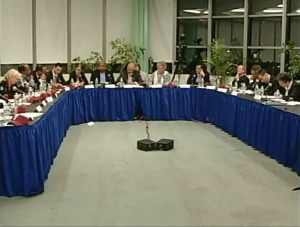Imagine if the Board of Elections put seven separate elected officials — Congressman, Senator, Governor, Comptroller, Attorney General, Assembly member, and State Senator — on the same ballot line, and made you mark just one oval to choose all of them.
Sounds like the old Soviet Union.
The decision by the 2010 New York City Charter Revision Commission to group seven unrelated proposals under ballot Question 2 — based on an opinion that the ballot was too small to show them separately — is just as cynical: It’s a way of telling voters, “If we let you vote seven or eight times, you could get confused and forget to vote ‘Yes’ on everything we want.” Continue reading


 City Limits
City Limits “The vast majority of the members of the commission publicly are opposed to term limits, period.”
“The vast majority of the members of the commission publicly are opposed to term limits, period.” The NYC Charter Revision Commission has published its
The NYC Charter Revision Commission has published its 
 Tuesday’s NY Times
Tuesday’s NY Times  We have to take our hat off to Clyde Haberman, a superbly skilled journalist, for bringing humor to his
We have to take our hat off to Clyde Haberman, a superbly skilled journalist, for bringing humor to his  The
The  On January 28 — two months before Michael Bloomberg convened a 2010 New York City Charter Revision Commission —
On January 28 — two months before Michael Bloomberg convened a 2010 New York City Charter Revision Commission — 
